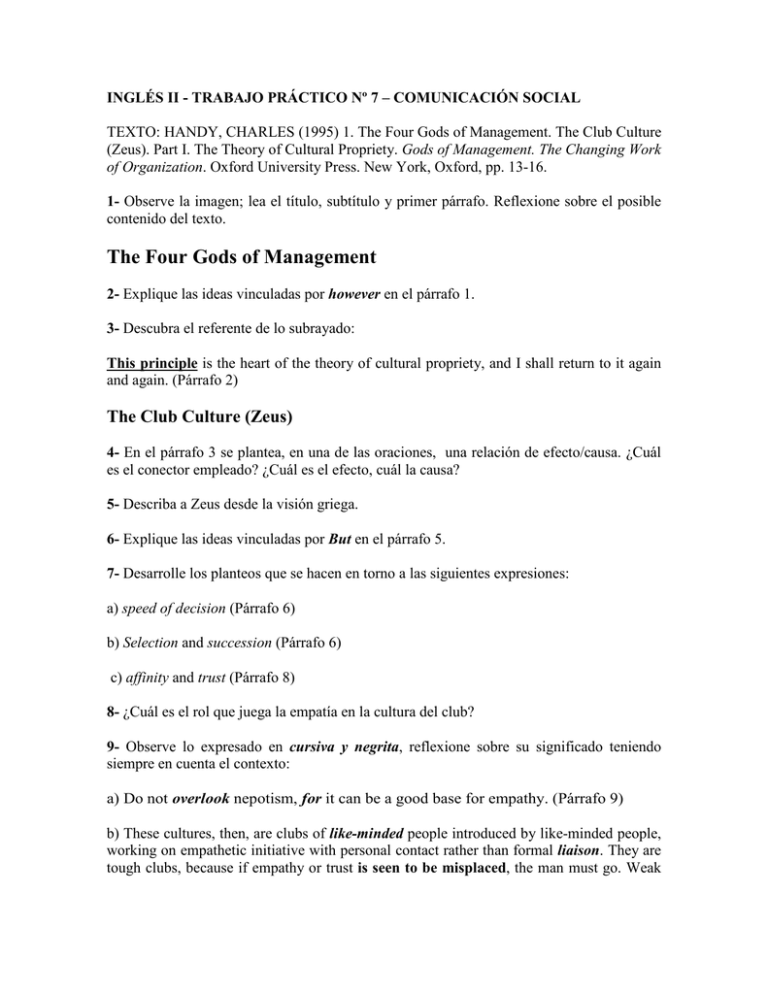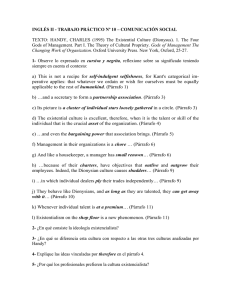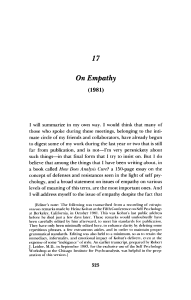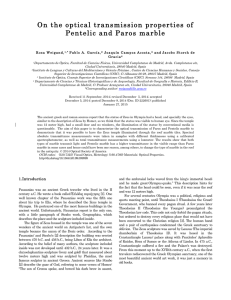The Four Gods of Management
Anuncio

INGLÉS II - TRABAJO PRÁCTICO Nº 7 – COMUNICACIÓN SOCIAL TEXTO: HANDY, CHARLES (1995) 1. The Four Gods of Management. The Club Culture (Zeus). Part I. The Theory of Cultural Propriety. Gods of Management. The Changing Work of Organization. Oxford University Press. New York, Oxford, pp. 13-16. 1- Observe la imagen; lea el título, subtítulo y primer párrafo. Reflexione sobre el posible contenido del texto. The Four Gods of Management 2- Explique las ideas vinculadas por however en el párrafo 1. 3- Descubra el referente de lo subrayado: This principle is the heart of the theory of cultural propriety, and I shall return to it again and again. (Párrafo 2) The Club Culture (Zeus) 4- En el párrafo 3 se plantea, en una de las oraciones, una relación de efecto/causa. ¿Cuál es el conector empleado? ¿Cuál es el efecto, cuál la causa? 5- Describa a Zeus desde la visión griega. 6- Explique las ideas vinculadas por But en el párrafo 5. 7- Desarrolle los planteos que se hacen en torno a las siguientes expresiones: a) speed of decision (Párrafo 6) b) Selection and succession (Párrafo 6) c) affinity and trust (Párrafo 8) 8- ¿Cuál es el rol que juega la empatía en la cultura del club? 9- Observe lo expresado en cursiva y negrita, reflexione sobre su significado teniendo siempre en cuenta el contexto: a) Do not overlook nepotism, for it can be a good base for empathy. (Párrafo 9) b) These cultures, then, are clubs of like-minded people introduced by like-minded people, working on empathetic initiative with personal contact rather than formal liaison. They are tough clubs, because if empathy or trust is seen to be misplaced, the man must go. Weak clubs cannot survive because they either must inject other methods of communication (and so lose speed) or risk making too many mistakes. (Párrafo 10) 10- ¿Por qué la cultura del club es menos costosa en lo que respecta a su administración? ¿Cuándo es efectiva esta cultura? 11- Explique las ideas vinculadas por because en el párrafo 11. 12- El párrafo 12 plantea una serie de críticas a la cultura del club. Elabore una lista con las mismas. The Four Gods of Management 1 Each of the four gods gives its name to a cult or philosophy of management and to an organizational culture. Each of these cultures also has a formal, more technical, name, as well as a symbol, or picture. The name, picture, and the Greek god each carries its own overtones, which combine to build up the concept I am trying to convey. They also help keep the ideas in one's memory. These names, signs, and gods do not amount to definitions, however, for the cultures cannot be precisely defined, only recognized when you see them. If you know anything about organizations, you should be able to recognize the descriptions as you read on. 2 It is important to realize that each of the cultures, or ways of running things, is good -for something. No culture, or mix of cultures, is bad or wrong in itself, only inappropriate to its circumstances. The fact that you do not like or approve of one of them makes it unsuitable for you, but not wrong or bad or inefficient in itself. This principle is the heart of the theory of cultural propriety, and I shall return to it again and again. The Club Culture (Zeus) 3 The symbol for Zeus is a spider's web. The organization that uses this culture probably has, as all other organizations do, divisions of work based on functions or products. These are the lines radiating out from the center, like the lines of a traditional organization chart. But in this culture, these are not the lines that matter. Rather, the crucial lines here are the encircling ones, the ones that surround the spider in the middle, for these are the lines of power and influence, losing importance as they go farther from the center. The relationship with the spider matters more in this culture than does any formal title or position description. 4 Zeus is the patron god. The Greeks chose, or created, their gods to represent certain features of the world as they saw it. Zeus was the king of their gods, and he reigned on Mount Olympus by means of thunderbolts (when crossed) or showers of gold (when seducing). He was feared, respected, and occasionally loved. He represented the patriarchal tradition with his irrational but often benevolent power, impulsiveness, and charisma. 5 Historically, the club culture is found most frequently in the small entrepreneurial organization. The boat fanatic who finds he can sell the boats he builds, gets his son to help with manufacturing, his nephew to sell them, and his cousin to keep the accounts is Zeus, and that is the way Zeus slowly builds his web. But this culture also prevails in broking firms, in investment banks, in many political groupings, in startup situations of all sorts, and on the bridge of many ships. 6 The club culture is an excellent one for speed of decision. Any situation to which speed is vital benefits from this style of management. Of course, speed does not guarantee quality. Rather, quality depends on the caliber of Zeus and of his inner circle: An incompetent, aging, or disinterested Zeus will quickly contaminate and slowly destroy his own web. Selection and succession are therefore rightly regarded as critical variables in these organizations, and much time and effort should be spent on them. 7 This culture achieves speed through an unusual form of communication: empathy. One afternoon I watched the young executive of a small broking firm at work in the precious metals exchange. He was making a series of rapid purchase and sale decisions, of what seemed to me to be alarming magnitudes, with no calculators, formulas, or resources to higher authority or expertise. "How do you make these decisions," I asked, "and what formal approval and authority do you need from your firm?" "Oh," he said, "I make my own decisions, but I try always to double-guess what the old man would do." "And if you fail?" I asked. "Curtains," he said, "for me." 8 The club culture can be cruel if your empathetic guess is wrong. But empathy needs no memos, committees, or formal authorities. Club cultures, indeed, are very short on documentation. Zeus does not write; he speaks, eyeball to eyeball, if possible, if not, then by telephone. Many times a successful Zeus has been illiterate, if not always innumerate. Instead, empathy depends on affinity and trust. 9 You cannot guess what the other man is thinking unless you think like him. There is little empathy between opposites. Your brother's son, your tennis partner, or your drinking companion is more likely to read your mind intuitively and quickly than is a stranger off the street. Do not overlook nepotism, for it can be a good base for empathy. Yet empathy without trust is dangerous, for it can be used against you. Again, it is more difficult to trust a stranger than someone whom you, or your friends, have known for a long time. Selection to club cultures is usually preceded by an introduction and is often confirmed by a meal. You know your friends at the table. 10 These cultures, then, are clubs of like-minded people introduced by like-minded people, working on empathetic initiative with personal contact rather than formal liaison. They are tough clubs, because if empathy or trust is seen to be misplaced, the man must go. Weak clubs cannot survive because they either must inject other methods of communication (and so lose speed) or risk making too many mistakes. 11 Club cultures are cheap to run. Trust is cheaper than control procedures, and empathy costs nothing. Money is channeled to where it matters, to people and the promotion of personal contact. Indeed, the telephone and travel bills of these cultures are very high, for Zeus does not write when he can talk. Club cultures are effective when speed is more important than correct detail, or the cost of a delay is higher than the cost of a mistake (which can often be rectified by a subsequent deal). They are good cultures to work in -provided you belong to the club because they value the individual, give him free rein, and reward his efforts. 12 Club cultures make history, and Zeus figures are the managers that journalists love most. (Most organizations started as club cultures, and many have not changed when they should have, for speed of decision and the personal imprint of the leader usually become less important as the organization reaches its first plateau of routine.) These cultures depend on networks of friendship, old boys, and comrades and can appear, therefore, to be nepotistic, closed shops, unpopular in these days of meritocracy and equal opportunity. They smack of paternalism and the cult of the individual, of personal ownership and personal power, of the kinds of things that gave the industrial revolution a bad name. They are unfashionable cultures and derided as examples of amateur management and relics of privilege. They should not be. Of course these methods of managing can be abused and often have been -an evil Zeus does evil things- but these organizational squirearchies are very effective in the right situation, for trust based on personal contact is not a bad way of getting things done.









